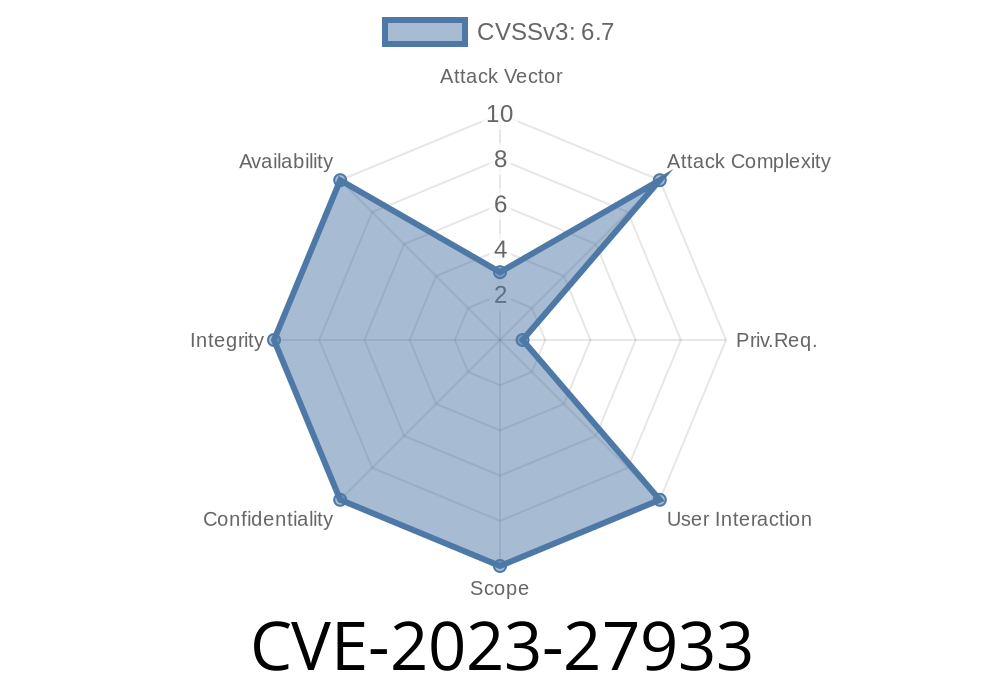---
What is CVE-2023-27933?
CVE-2023-27933 is a serious security vulnerability that was found in Apple’s operating systems—specifically iOS, iPadOS, macOS, watchOS, and tvOS. The flaw could let an app with root (administrator) privileges run any code it wants with kernel-level privileges. In simple terms: if an app could get root access, it could take complete control of the device by tricking the operating system.
Apple fixed this issue by “improving memory handling,” which often means correcting the way programs manage the information they store and access temporarily while running.
Technical Details: How Did the Vulnerability Work?
This vulnerability is known as a "privilege escalation" bug inside the kernel, the core of the operating system. Here’s what makes it dangerous:
- An app already running as root (not common, but possible through other attacks or misconfigurations) could use this bug to execute code as the kernel.
- With kernel privileges, an attacker can bypass every security measure, read or write any data on the device, or even install silent malware.
Note: The flaw depends on already having root access. That means it's often used together with other bugs in multi-step attacks.
Apple did not publish the raw details, but from publicly shared information, the bug relates to poor memory management (likely a use-after-free, buffer overflow, or similar issue) in the kernel code.
Example: Unsafe Memory Handling
While we don’t have Apple’s source code, here’s a simple (and imaginary) C code snippet to demonstrate how such bugs often happen:
void process_input(char *input) {
char buffer[64];
strcpy(buffer, input); // No bounds checking!
// ... do something with buffer ...
}
If input is longer than 64 characters, it will overflow buffer and possibly overwrite important data—including return addresses—which could allow custom (malicious) code to run.
Kernel-level bugs are usually more complex and might look like this simplified example
struct data *ptr = malloc(sizeof(struct data));
free(ptr); // Free the memory
use(ptr->value); // Use-after-free: accessing memory that's no longer valid!
If an attacker controls the memory at ptr after it is freed, they may manipulate the system.
Exploit Details
Public exploits for CVE-2023-27933 are not widely available, but here’s how attackers would typically use such bugs:
Inject and execute code with kernel privileges, bypassing most security features.
This kind of exploit is very powerful but requires advanced skills and typically targets high-value victims (like in corporate espionage or spyware).
Example Exploit (Hypothetical)
/* Pseudo-code that shows the concept, not an actual Apple exploit */
int main() {
// Step 1: Get root privileges (not shown)
// Step 2: Trigger the kernel bug
send_malicious_data_to_driver();
// Step 3: Our code now runs in the kernel context
escalate_privileges();
return ;
}
This is only illustrative; real exploits would be much more complex.
How Apple Fixed It
Apple’s advisory (Apple security releases & advisories, see references below) says:
“The issue was addressed with improved memory handling.”
References & Further Reading
- Apple Security Update for CVE-2023-27933
- CVE details: CVE-2023-27933
- Apple Security Releases
Closing Thoughts
CVE-2023-27933 highlights why keeping your software up to date is critical. Even companies like Apple, with massive security teams, can have hidden kernel bugs that open the door to attackers. If you have not updated your Apple devices recently, make this your top priority.
Timeline
Published on: 05/08/2023 20:15:00 UTC
Last modified on: 07/27/2023 04:15:00 UTC
